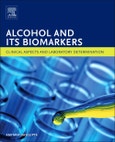Please Note: This is an On Demand product, delivery may take up to 11 working days after payment has been received.
Table of Contents
- Alcohol: Use, Abuse and Issues with Blood Alcohol Level
- Genetic Aspect of Alcohol Metabolism and Drinking Behavior
- Measurement of Alcohol Levels in Body Fluids and Transdermal Alcohol Sensors
- Alcohol Biomarkers: An Overview
- Liver Enzymes as Alcohol Biomarkers
- Mean Corpuscular Volume, and Carbohydrate Deficient Transferrin as Alcohol Biomarker
- Beta-hexosaminidase, Acetaldehyde-Protein Adducts and Dolichol as Alcohol Biomarkers
- Direct Alcohol Biomarkers: Ethyl Glucuronide, Ethyl Sulfate, Fatty Acid Ethyl Esters and Phosphatidylethanol
- Less commonly Used Alcohol Biomarkers and Proteomics in Alcohol Biomarker Discovery
- Genetic Markers of Alcohol Use Disorder
Authors
Amitava Dasgupta Professor, Pathology and Laboratory Medicine, McGovern Medical School, The University of Texas, Houston, TX, USA. Dr. Amitava Dasgupta received his Ph.D degree in Chemistry from Stanford University and received his medical training in Toxicology and Clinical Chemistry from the Laboratory Medicine Department of the University of Washington School Of Medicine at Seattle. He is board certified in both Toxicology and Clinical Chemistry by the American Board of Clinical Chemistry. He is a tenured Full Professor of Pathology and Laboratory Medicine at the University of Texas Health Sciences Center located at the Texas Medical Center at Houston. He is also the Director of Clinical Chemistry and Toxicology Laboratory of Memorial-Hermann Laboratory Services, the major clinical teaching hospital of the University of Texas. In addition, he is also the Medical Director of Memorial-TIRR Hospital laboratory services.Dr. Dasgupta has published over 235 scientific papers and edited, co-edited, authored or co-authored 20 books including books published by Elsevier. He is on the Editorial Board of five major medical journals including American Journal of Clinical Pathology, Archives of Pathology and Laboratory Medicine, Therapeutic Drug Monitoring, Clinica Chimica Acta and Journal of Clinical Laboratory Analysis. He lectures both nationally and internationally on drug and alcohol testing and acts as an expert witness for the State of Texas for alcohol and drug related criminal prosecutions.








